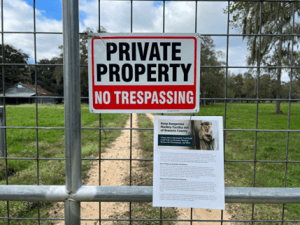PETA has submitted a formal complaint to the federal Competition Bureau alleging that the “Responsible Down Standard” (RDS) and “Responsible Animal Fiber” (RAF) labels created by third-party certifier Textile Exchange (TE) are misleading and deceive consumers. The complaint follows multiple PETA exposés of the down industry revealing that filth, suffering, and violent deaths are industry norms and can be found even on certified farms.
Canadian retailers such as lululemon, Aritzia, and Arc’teryx boast about their RDS and RAF certifications—which TE created following multiple PETA’s exposés—which encourages customers to buy their products under the assumption that the animals used to produce them were treated humanely. PETA’s complaint asserts that TE and the companies that use its labels make marketing claims that deceive customers, whether by design or unintentionally:
- TE claims that its farms meet “strict animal welfare standards” and that “animals are well cared for and never treated with cruelty”—yet its standards allow the use of the “responsible” label on products for weeks after inspectors find violations. PETA Asia’s recent investigation into Vietnamese duck farms and slaughterhouses that sold “responsible” down shows ducks suffering from gaping and bloody wounds, languishing in dirty sheds and lots strewn with feces, and being stabbed in the neck and having their feet cut off while still conscious.
- TE claims that its farms are independently audited, but the audits are typically preannounced, and under its area certification scheme, some farms may never be visited by an independent auditor. PETA Asia’s investigation revealed that a farm in Russia that was reportedly RDS-certified didn’t even know that it was and had been failing to stun birds before hacking off their heads with a dull axe.
- TE claims that it tracks the supply chain of its certified down “from farm to final product,” but it doesn’t require every parent farm that supplies eggs and hatchlings to even be certified. Parent farms therefore often live-pluck birds, a painful and traumatic process—prohibited by TE’s standards—in which their feathers are torn out while they’re conscious. This process is repeated once the feathers grow back and can be inflicted up to 16 times before the bird dies or is slaughtered.
“If consumers knew that ducks were stabbed and had their feet cut off while still conscious for ‘responsible’ down, they’d never buy these products,” says PETA Director of Corporate Responsibility Laura Shields. “PETA is urging the Competition Bureau to investigate Textile Exchange for its deceptive marketing scheme and prevent it from certifying materials with misleading labels.”
PETA’s complaint asks the Competition Bureau to require TE to remove all misleading statements from its marketing and issue corrective explanations that reveal how the animals on its certified farms are actually treated.
PETA—whose motto reads, in part, that “animals are not ours to wear or abuse in any other way”—opposes speciesism, a human-supremacist worldview. For more information about PETA’s investigative newsgathering and reporting, please visit PETA.org, listen to The PETA Podcast, or follow the group on X (formerly Twitter), Facebook, or Instagram.
The post ‘Responsible Down’ Label Humane-Washes Cruelty, Says PETA in Competition Bureau Complaint appeared first on PETA.



